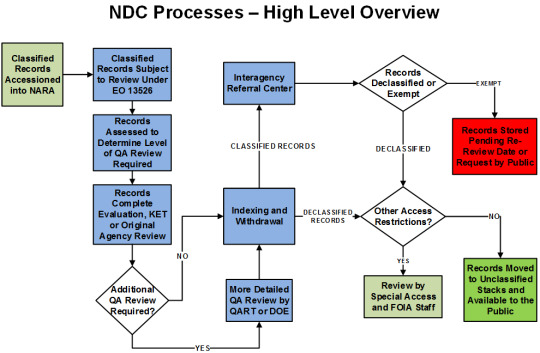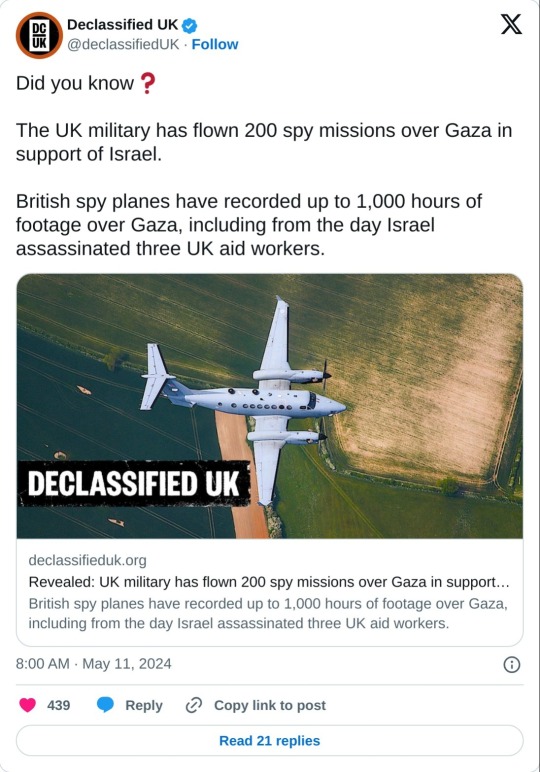#— declassified information
Text

𝄡symbolstelic | Alclefsymbolstelic // Constelic term for people who stel the 𝄡 (Alto/Tenor Clef) symbol
@constelicflags

#— declassified information#mogai friendly#mogai coining#mogai flag#liom coining#liom#my terms#my flags#mogai#constelic#symbolstelic#𝄡symbolstelic#alclefsymbolstelic
19 notes
·
View notes
Text
my great grandfather used to live in the house i live in now cause it's like 60 years old and a house near here literally blew up in the middle of the night and the fbi knocked on his door and was like hey can you help us please
#because he armed and disarmed bombs and i guess they somehow knew someone like him lived near the explosion#it's just crazy to me that the fbi were here at the house i'm living in like what#also my grandma just randomly dropped previously classified information about her dad onto us and i was like HUH????#and she was like but don't tell anyone...and i'm like this was the 40s i think it's declassified now considering it was ww2
5 notes
·
View notes
Text
The Black Vault – Document Archive . A must visit website !
#freedom#news#america#usa#information#facts#proof#documents#issues#government#FBI#CIA#declassified documents#declassification
5 notes
·
View notes
Text
Archivists on the Issues: Classified Records, Archives, and Fictional Depictions [Part 1]
Archivists on the Issues is a forum for archivists to discuss the issues we are facing today. Today’s post comes from Burkely Hermann (me), Metadata Librarian for the National Security Archive and current I&A Blog Coordinator. There will be spoilers for each of the books, animated series, films, and other media he will be discussing. This was originally published on February 7, 2023 on the Issues & Advocacy WordPress blog.

High-level overview of National Declassification Center processes, as shown in a post on the NDC blog in 2019
Previously on this blog, Rachel Mattson examined whether police body camera footage is public record or is classified, arguing that it should be a public record. Other blogposts on this blog have examined whether the Senate Intelligence Committee Report on Torture is a Federal or Congressional Record, noted selective declassification by the French government, which declassified over 200,000 records about Vichy government’s collaboration with the Nazis but none about France's occupation of Algeria, and noted the tendency of politicians to avoid documenting their activities and stonewall FOIA requests.
In January 2022, the Director of National Intelligence April Haines argued, in a letter to U.S. Senators Ron Wyden and Jerry Moran that there are "deficiencies" in the current declassification system, and notes the burden of mandatory declassification requirements while the amount of classified material expands. My colleague from National Security Archive, Lauren Harper, noted that Haines, many months later, said that overclassification is a national security threat. Some of these classified records are in the hands of the National Archives, otherwise known as the National Archives and Records Administration (NARA), organized into Top Secret, Secret, and Confidential. Other records are deemed unclassified if they do not meet the existing requirements for classification.
Classification of records in the U.S. has often been outlined in presidential executive orders, beginning with President Truman in 1951. National security generally described as the primary reason for classification. Over the years, rules changed and the role of NARA increased. This has even resulted in a part of the agency dedicated to declassification, the National Declassification Center (NDC), which was established in 2009, in accordance with Executive Order 13526. This went beyond the agency's representation on the Interagency Security Classification Appeals Panel (ISCAP), or the Information Security Oversight Office (ISOO), which oversees the security classification programs in "both Government and industry", and reports to the President annually. The ISOO, role on ISCAP, and NDC, most recently, have given NARA an important position in the entire classified information management process. [1]
Unsurprisingly, NARA has been in the public focus, especially for storing presidential records from the Obama Administration, and afterward. Some politicians have claimed the agency is an "enemy" and have wanted to dismantle it because of NARA's push to return classified records to the public, rather than having the records stored in shoddy locations or controlled by presidents as their personal property. [2] This makes reports, in past years, like in May 2012, that boxes of classified government records disappeared from Washington National Records Center all the more concerning, as it could be representative of a larger trend.
Currently, there are measures in place for declassification of government records, either enshrined in executive orders or provisions of the Freedom of Information Act (FOIA). However, the FOIA system is currently flawed, especially with existence of various exemptions which can be used to redact documents or reject records requests. [3] There are similar issues with Mandatory Declassification Review (MDR) requests. As one government report put it, storage of classified materials is "widespread" across the U.S. government, with NARA storing records from all agencies at central facilities. Even so, some have argued that politicians have neglected the National Archives and failed to "control official secrecy", belaying assumptions about government transparency, and resulting in the crisis which will make it harder for researchers to examine the "state’s inner workings". Recent developments, such as a drop in the annual budget of NARA, attrition, and loss of institutional memory have resulted in the agency having one of the lowest levels of job satisfaction in the federal government. All the while, funding for declassification has decreased and backlogs for declassification have increased. [4]
NARA is not the only archives which handles and processes classified records. There are established procedures for classification of records held by the New South Wales Archives in Australia, British Public Record Office, Taiwanese government, Israeli Defense Force, State Archives of Poland, National Archives of Brazil, South African State Archives Service (later renamed National Archives and Records Service), National Archives of Korea, and National Archives of France. Even the archives of the United Nations has a classification level of Strictly Confidential, necessitating declassification requests, while archival materials over 20 years old are "generally open to the public for research". [5]
As Electronic Records Archivist Amy Wickner argued, archivists have the "power to name and classify," a power which has "material effects on the world". This power can be used to make records more accessible or to make them harder to access. The latter is the case if access is only "granted or refused on an individual basis". At times, more restrictions are imposed because of compliance with professional standards or data within in a record rather than the document itself. This includes including personal data. On the other hand, records which should be publicly available, like agreements between carceral facilities and FamilySearch for indexing of historical records, have a possibility of redaction, despite the lack of personal or sensitive information. [6]
© 2022-2023 Burkely Hermann. All rights reserved.
Continued in part 2
Notes
[1] Čtvrtník, Mikuláš. "Classified records and the archives." Archival Science 22 (2022): https://doi.org/10.1007/s10502-021-09370-3.
[2] O'Rourke, Ciara. "Claims about Obama Foundation keeping classified records in an abandoned warehouse are wrong." Poynter, Oct. 7, 2022; Caputo, Marc. "Barr suggests Trump 'deceived' the government over classified records." NBC News, Sept. 2, 2022; Suebsaeng, Asawin and Adam Rawnsley. "Trump Tells His Lawyers: Get ‘My’ Top Secret Documents Back." Rolling Stone, Aug. 23, 2022; Alemany, Jacqueline, Isaac Arnsdorf, and Josh Dawsey. "Inside Trump’s war on the National Archives." Washington Post, Aug. 27, 2022; Legare, Robert. "Archives found 100+ documents with classified marking in first 15 Trump boxes." Yahoo! News, CBS News. Aug. 23, 2022; Kochi, Sudiksha. "Fact check: Archives agency transferred 30 million unclassified Obama records to Chicago." USA Today, Oct. 3, 2022; Derysh, Igor. "'He has the right to remain silent': Legal experts say Trump’s Truth Social post may be 'evidence'." Salon, Nov. 29, 2022; "Press Statements in Response to Media Queries About Presidential Records." National Archives and Records Administration, Nov. 9, 2022; Reilly, Steve. "What the government’s former top classified records overseer sees in the Mar-a-Lago search." Grid, Aug. 10, 2022; Wood, Jennifer. "Donald Trump Just Couldn’t Keep His Mouth Shut And Went Ahead And Confessed: ‘I Did’ Steal Classified Documents From The White House." Uproxx, Nov. 29, 2022; "Fact Check-National Archives and Records Administration says they manage all of Obama’s Presidential records, contrary to claims online." Reuters, Sept. 30, 2022. There have also been cases, like a lawsuit by the conservative legal group, Judicial Watch, against NARA, aiming to declassify Clinton Administration efforts, but their efforts were dismissed by the courts.
[3] "Freedom of Information Act flaws need fixing, experts say." American Bar Association, Aug. 4, 2018; "The media’s problems with FOIA." Reporter's Committee for Freedom of the Press, Winter 2007; Goos, Christian. "Seeking Access to Classified Records: Requesting Mandatory Declassification Review (MDR) versus Freedom of Information Act (FOIA)." ISOO Overview, Oct. 1, 2021.Also of note are pages like the "Overview" webpage on the Records Management Directorate and Army Declassification Directorate, the NSA's page on supposed declassification/transparency initiatives, and a press release about ZL Tech's support of a "records management platform with DOD classified technology".
[4] "Appendix V: Central Storage, Declassification and Destruction" in Classified Information: Costs of Protection are Integrated with Other Security Costs: Report to the Chairman, Information, Justice, Transportation, and Agriculture Subcommittee, Committee on Government Operations, House of Representatives (United States General Accounting Office, 1993), 26; Connelly, Matthew. "State Secrecy, Archival Negligence, and the End of History as We Know It." Knight First Amendment Institute, Sept. 21, 2018. The latter article also says that state secrecy and state archiving began at the same time, around the establishment of NARA and into World War II.
[5] "Standard on the physical storage of State records." New South Wales Archives in Australia, Feb. 2019; Wittner, Laurence. "What I Learned About Governments from Researching Classified Documents." History News Network, Sept. 4, 2022; "The Management Regulations for Classified Archives." Law & Regulations Database of the Republic of China (Taiwan), May 10, 2005; Peterson, Terrence. "The French Archives and the Coming Fight for Declassification." War on the Rocks, Mar. 6, 2020; Makleff, Ron. "Sovereignty and Silence: The Creation of a Myth of Archival Destruction, Liège, 1408." Archive Journal, Aug. 2017; "Public Reference Services." United Nations Archives and Records Management Section, accessed Dec. 5, 2022; Franco, Shirley. "Transparência e opacidade do estado no Brasil: Usos e desusos da informação governamental." The American Archivist 84, no. 1 (2021): 196; Sromek, Teresa. "Teoria i praktyka archiwistyki USA." The American Archivist 83, no. 1 (2020): 177; Harris, Verne and Christopher Merrett. "Toward a Culture of Transparency: Public Rights of Access to Official Records in South Africa." The American Archivist 57, no. 4 (1994): 681-2, 684, 688, 691; Lee, Kyong. "Political Democracy and Archival Development in the Management of Presidential Records in the Republic of Korea." The American Archivist 69, no. 1 (2006): 119-120,129, 134-135, 137-138.
[6] Wickner, Amy. "Recognizing Co-Creators in Four Configurations: Critical Questions for Web Archiving." Journal of Contemporary Archival Studies 8 (2019): 4; Geraci, Noah and Michelle Caswell. "Developing a Typology of Human Rights Records." Journal of Contemporary Archival Studies 3 (2016): 18; Taylor, Claire, Lucia Brandi, Cecilia A. Acosta Sánchez, and Marcelo Díaz Vallejo, "Archives of Human Rights and Historical Memory: An Analysis of Archival Practices ‘From Below’ in Four NGOs in Colombia Archival Practices ‘From Below’ in Four NGOs in Colombia." Journal of Contemporary Archival Studies 8 (2021): 11, 16; Rinn, Meghan R. "Review of The Future of Literary Archives." Journal of Contemporary Archival Studies 7 (2020): 4; Szekely, Ivan. "Do Archives Have a Future in the Digital Age?" Journal of Contemporary Archival Studies 4 (2017): 4; Jansson, Jenny, Katrin Uba, Jaanus Karo, "Labor Gone Digital (DigiFacket)! Experiences from Creating a Web Archive for Swedish Trade UnionsArchive for Swedish Trade Unions." Journal of Contemporary Archival Studies 7 (2020): 5; Windon, Katrina and Lydia M. Tang. "Archival discretion: a survey on the theory and practice of archival restrictions." Journal of Contemporary Archival Studies 9 (2022): 8.
#archival science#archival studies#archives#familysearch#genealogy#classification#classified records#declassified#nara#national archives#foia#freedom of information#mdr requests#president truman#prisons#records center#obama library#trump library#anti trump
2 notes
·
View notes
Text
youtube
‘It doesn’t have to be a process as I understand it … You’re the president. You make that decision.’ — Former President Trump really went on Fox News and told Sean Hannity he can declassify top secret documents purely by the power of thought
For more U.S. news & politics, subscribe to NowThis News.
#trump #politics #news #NowThis
#now this news#now this#solarpunk#USA#donald trump#classified information#declassified#fox news#Sean Hannity#security risk#Youtube
3 notes
·
View notes
Text
y'all ever get a post on your feed that sits on the precipice of the content youd usually consume only to veer so sharply off course as to impale you on a pike and leave you to gather your gooey remains and fucking book it
#please please PLEASE tumblr tell me when i followed this person?#because what the fuck#there is no way you are fear mongering people into passive action w the same incendiary language politicians use to propagandize the public#whilst saying people who disagree with passive action are engaging in the same incendiary behavior as politicians cosigning their deaths#via “moral purity politics” because they want to vote third party because they dont agree with voting in people who have actively cosigned#and aided multiple genocides and human rights violations#and because they agree violent action can be a catalyst for change#and saying violent rebellion is akin to and a direct predecessor OF dictatorial rule#whilst mocking all the people in your notes telling you about declassified CIA documents where theyve admitted to butchering citizens acces#to information & assassinating political figureheads to paint leftist regimes as inherently authoritarian#and youre saying this all in the name of MLK#MLK who worked with Malcolm X and the Black Panthers#nigga#is choking on the boot to put on a show for the panopticon really that important?#politics#p-ssypink
0 notes
Text


[SOURCE]
In early November, Israel began warning that al-Shifa Hospital, Gaza’s largest, where thousands of civilians were sheltering, was being used by Hamas as a major command center.
That prompted a vigorous debate among Biden officials over whether to publicly support Israel’s claim, according to three senior administration officials who spoke on the condition of anonymity to disclose internal discussions. Some worried that Israel would see such a statement as a green light to raid the hospital, while others wanted to use the information to show the public how Hamas embedded itself among civilians to underline the complexities Israel faced.
On Nov. 14, the White House decided to publicly back Israel on the matter. “We have information that confirms that Hamas is using that particular hospital for a command-and-control mode,” Kirby told reporters aboard Air Force One, citing declassified intelligence. “That is a war crime.”
Kirby added that the White House did not “want to see a firefight in the hospital where innocent people, helpless people, sick people are simply trying to get the medical care that they deserve.”
Hours later, the IDF began its raid of al-Shifa, drawing condemnation from the World Health Organization and human rights groups. The hospital’s operations collapsed, resulting in the death of least 40 patients, including four premature babies, according to the United Nations.
Van Hollen, who had received a classified briefing about the U.S. intelligence on al-Shifa, said there were “important and subtle differences” between what Biden officials were saying publicly and what the intelligence actually showed. “I did find there to be some disconnect between the administration’s public statements and the classified findings,” the senator said.
#yemen#jerusalem#tel aviv#current events#palestine#free palestine#gaza#free gaza#news on gaza#palestine news#news update#war news#war on gaza#genocide joe#butcher biden#joe biden#gaza genocide#genocide
2K notes
·
View notes
Note
hi uh
can I ramble abt my oc
YES OMG I WILL ALWAYS ACCEPT OC RAMBLINGS !!!!!!!!! both publicly and if u wanna just dm me!! ocs r SOO welcome and loved here i swear
#declassified#anon i promise we wont bite ( except like at any information bc hfhsbdbf good soup )#basically i would LOVE to hear any and all oc talk#see any fanart#hear about aby ships#tell me ALLLLLLL
0 notes
Text
Take the case of journalist William Zukerman. A respected Yiddish- and English-language writer in the 1930s and 1940s, with clips in Harpers and the New York Times, Zukerman started his own biweekly, the Jewish Newsletter, in 1948. It was highly critical of Jewish nationalism and its destructive effects in the new state of Israel and beyond.
In one story, Zukerman reported about a Holocaust survivor who had recently resettled in Israel, in the former home of an Arab family. The survivor became “openly obsessed” about her morality, Zukerman wrote, after her children found some of the evicted family’s possessions. “The mother was suddenly struck by the thought that her children were playing with the toys of Arab children who were now exiled and homeless,” Zukerman continued. “Is she not doing to the Arabs what the Nazis did to her and her family?”
By the early 1950s, the Jewish Newsletter had a few thousand subscribers, and its work was republished in many other outlets, Jewish and non-Jewish, with much larger circulations — Time magazine, for instance. Not all of Zukerman’s readers, however, opposed Zionism. Each of the hundreds of chapters of the Jewish student organization Hillel had a subscription to the Jewish Newsletter.
According to declassified Israeli Foreign Ministry files found by Levin, the Israeli government was alarmed by Zukerman’s influence on American Jews. It started a campaign to keep him from “confusing” Zionists about Israel and Palestinian rights. Israel aimed a letter-writing campaign at the New York Herald Post to discourage the paper from running more of Zukerman’s work, and hatched a scheme to distribute boilerplate text for Zionists to mail to other editors, asking them not to publish Zukerman anymore. The head of Israel’s Office of Information in New York worked to have the prestigious London-based Jewish Chronicle get rid of Zukerman’s column, and he lost the position. By 1953, his work no longer appeared in the Jewish press.
217 notes
·
View notes
Text


Clefgender | Genderclef // Musicgender that is related to musical clefs (treble, alto, bass). Clefgender can be a gender on it's own, referring to; related to musical clefs in general, related to two or more musical clefs, and/or being fluid between genders related to clefs






Gendertreble [left] // Musicgender that is related to the treble clef; it can be described as being as like it is set in a higher range, or is higher pitched.
Genderalto [middle] // Musicgender that is related to the alto clef; it can be described as being like it is set in a mid-range, or is 'between' gendertreble and genderbass while still being distinct
Genderbass [left] // Musicgender that is related to the bass clef; it can be described as being as like it is set in a lower range, or is lower pitched.
Genderclef + subterms originally coined on 07.21.2014 by no-bucks-for-this-doe
We wanted to make an alt flag since (as far as we know) the original flags was just the musicgender flag + the clef itself, which makes hc/logos/icons etc kind of difficult and hard to identify

#— declassified information#mogai friendly#mogai coining#mogai flag#liom coining#gender coining#liom gender#liom#my terms#my flags#mogai#pemogai#pro endo mogai#musicgender#genderclef#clefgender#gendertreble#genderalto#genderbass
19 notes
·
View notes
Text
whilst I am sick in bed, I want to put something out here before things start getting wild with conspiracy theories about this whole submersible debacle. because I think we will start seeing a lot of conspiracy theories starting up. some irrational, but some rational!
also note that I have no educated experience on these matters, just 33 years of living and a special interest in both the titanic and maritime disasters. so take everything with a grain of salt(water).
and while yes, if they’re dead, I genuinely think every navy and coast guard already knows and has known since like the first three hours since the sub went missing, I also genuinely do not think this was out of malicious or subversive intent, or trying to hide some big secret, and I will explain why:
underwater explosions/implosions make a very characteristic sound. this is called a bubble pulse: multiple booms being the result of initial explosion, followed by water pressure collapsing the gas bubble.
the major powers of the world, certainly the US with SOSUS/IUSS, have underwater listening stations. this is a system of underwater hydrophones and listening devices originally meant to track soviet submarine activity and underwater nuclear tests. this system was already quite powerful in the 60s, and its capabilities by now in the 2020s are classified but likely even moreso powerful. this is not me saying THEY’RE LISTENING TO US AND PUTTING TRACKERS IN US this is me saying “by the early 90s they could track a single whale over the entire Pacific for several years.”
if the submersible imploded--and I am leaning toward it not being built well enough to withstand four days of 375 atmospheres worth of pressure--then this was almost undoubtedly heard by listening stations across the atlantic
so why not tell the public?
despite having declassified much of the program, SOSUS/IUSS still has many parts that remain classified. to reveal that they heard the implosion would be to also reveal potentially delicate information such as station positions (figuring out WHERE a classified station might be based on the fact that it picked up the sound, and figuring out the minimum capabilities of such a system).
we’re already in kind of a weird proxy war with the Russians, again, so the government’s paranoia about not letting anything leak to them Russkies is, again, at an all-time high. I will state though that classified information is actually like, at the bottom of my list of “reasons why they may not have said anything immediately.”
this is an incredibly... unique situation. while I have no doubt they heard the implosion, they may not have been able to concretely confirm that it was an implosion, and an implosion of a civilian submersible, until after the story of the missing sub had already gotten out to the public. one of those “it looked like a duck and quacked like a duck so I’m pretty sure it was a goddamn duck, but I technically need to run tests to make 100% certain that it was in fact a duck, because if I’m wrong that could mean big trouble.”
in addition, to 100% confirm an implosion, typically the debris field has to be actually spotted on the sea floor, in addition to all the previous criteria being met. they have been trying to find a debris field... in a bigger, messier debris field.
they need to do this, because if there’s even a .0000000001% chance that they are still alive and you left them for dead, that would be... bad, for a lot of reasons
because the debris field has not been found and there IS a .0000001% chance that they could be alive, they still need to TREAT it as a rescue operation. this is standard procedure for like. everywhere.
even if they WERE still alive, they were going to die. every rescue party out there right now knows this. just planning to recover debris from that depth often takes months if not years of planning, let alone a sub about to run out of air in four days, max. in these situations, where the rescuers know the victims are alive but will, without fail, die, you have to still TREAT IT as if they are able to be saved (while also, quietly, making sure no one else is going to be further hurt). for the sake of the victims, their families, and the public at large. for the basic dignity of the victims. yes, out of compassion.
a comparable situation is when an EMT arrives to the scene of a traffic accident and knows, immediately, that this person, while not technically dead, is absolutely not going to make it. the EMT is still going to attempt to do everything they can to save that person, for their dignity and for the slim chance that maybe, by some miracle, they can help. you don’t give up until you know they’re actually dead. this is standard procedure and also like. a basic human compassion thing.
this is also likely why, if you’ve been watching any news about this, we’ve not seen any illustrations of “potential ways to rescue the sub,” or how authorities think they might do it, only diagrams and illustrations of where the sub might be or the depth it might be at. ideas have been floated around, but nothing concrete. because there is nothing concrete. at least, that’s what I’ve seen but that’s probably confirmation bias.
so yeah. in the coming days or years or whatever, I think it’ll come out that rescuers have known all along what happened and kept that little part quiet. but I also think it’s for the most boring, mundane reasons possible: standard procedure technicalities and human compassion while having to navigate a sticky situation between the media and the public.
535 notes
·
View notes
Text
'I Won't Stop Until Israel Admits Its Ties With the Pinochet Regime'
Lily Traubman, who immigrated to Israel in the 1970s, hopes the documents she is trying to get from the Defense Ministry and the Foreign Ministry may even contain information on her father's killers.
A year ago there were headlines when four women filed a suit for sexual abuse they suffered in prison during the Pinochet period. They demanded that the abuse be recognized as a political crime and that their torturers be brought to trial. Were such attacks something that was directed from above?
Of course. Have you heard of “La Venda Sexy”? It was a detention center where people were tortured. The name actually means “Sexy Blindfold,” because the detainees’ eyes were covered the whole time and they were subjected to sexual abuse.
All the detainees were blindfolded the whole time?
Yes. They were arrested, blindfolded and put into a room, together, with their eyes covered. Then they were tortured. Most of the female detainees were raped and underwent sexual abuse. A girlfriend of mine was held there but was not raped. She told me she’d felt fortunate, but then came New Year’s and she was raped. They’d kept her for the holiday.
Venda Sexy was truly awful. They had dogs that were trained to rape women, and they would force spouses and family members to watch the rape. More and more testimonies about these abuses come out all the time.
And throughout this whole period, Israel, under prime ministers Yitzhak Rabin, Menachem Begin and Shimon Peres, maintained excellent relations with Chile. The two countries supported each other in the United Nations and signed bilateral agreements. Army Chief of Staff Mordechai Gur visited Chile in 1978, as did Deputy Prime Minister David Levy in 1982. Both met with Pinochet.
Pinochet was even invited to the synagogue in Santiago on Yom Kippur. Other presidents were not invited.
The documents declassified by the Americans also contain references to arms deals with Israel. Secretary of State George Shultz noted in a 1984 document that Britain, France, Israel and Germany were Chile’s arms suppliers.
All the weapons of the Chilean police and army were Israeli. In Chile I went around with a photograph of my brother in uniform. At checkpoints and in searches I would take out the picture and tell them that this was my brother, who was an officer in the IDF – even though he was a regular soldier – and that did the trick. The Chilean army greatly admired the Israeli army. When Pinochet wanted to visit Israel, he threatened that if he were not received here he would cancel a large arms deal. No dictator in the world, however bad he may be, can exist without international support. The dictatorship in Chile lasted as long as it did because there were countries that supported it, and Israel was one of them.
Israel describes itself as “the state of the Jewish people,” but there are about 20 missing Jews in Chile who were murdered during that period, while Israeli governments and the military maintained close ties with Chile, accorded it legitimization in international forums and provided aid and training to its military and intelligence units.
155 notes
·
View notes
Text
Playing the Game
Pairing: Javier Peña x CIA!reader
Summary: The Aftermath [4.0k]
Warnings: interrogation setting, language, description of injuries (NOTHING GRAPHIC), discussions of nightmares, short dialogue in Spanish, Chekov’s gun if you squint really hard, some smutty thoughts and happenings, a little bit of backstory, canonical violence

"I understand that the events from a few months ago are still fresh in everyone's minds," you say, looking around the room of higher-ups. It's a big mix. CIA, DEA, military personnel, and even Ambassador Noonan. That's standard, you think. It's not every day an undercover CIA agent gets made in the streets of Medellín, kidnapped, and tortured for three days. "But my health has improved over these past few weeks, and my doctors have cleared me to return to the field. Given the grace of the board here today, I would like to return to work and finish the job I came to Colombia to do."
You accepted the transfer to the United States Embassy in Bogotá a little over two years ago and did desk work for a few months before committing to an undercover job to collect intel on the cartel. It was safe enough. Most days were uneventful as you tuned into the codes and subtle behaviors of those involved. Still, you almost always carried your service weapon with you. You made the right friends. You kept your head down. You checked in with another CIA agent once a week and regularly relayed information to two DEA agents, Javier Peña and Steve Murphy. You were fine until you weren't.
You still don't really know how they found out you were undercover or exactly what happened over those three days after they snatched you from the sidewalk. Sometimes, you're able to string together conversations had between them beating the shit out of you, but it's a lot of you repeating yourself. "No sé nada. No sé nada." You said over and over again as they accused you of lying and went back to torturing you. It wasn't an official ruling, but the people who stormed into the building collectively believed you were dead. When they stumbled in to find you sitting there, beaten but breathing, they thought it was a small-scale miracle. Upon further investigation and questioning, they were even more surprised you didn't give up any information. Instead, you threw out false leads to buy yourself and the embassy time. This wasn't your first rodeo. You knew better.
All in all, you walked away starving and dehydrated with a perforated eardrum, deep lacerations from your own pair of handcuffs, a broken wrist, countless cuts and bruises, a concussion, a fucked up knee, and cigarette burns on your arms. Guards parked themselves outside your hospital room and your apartment until they were sure the threat to your life was suspended. Since then, you've been stuck at home, bored to tears, doing physical therapy exercises to regain strength in your leg, and reading declassified files sent to you. You're up to date on the latest happenings in Medellín and more than ready to come back.
"Agent, I appreciate your willingness and courage to return to work, but how do you know the sicarios won't try to come after you again?" Colonel Wysession asks, and you shrug.
"How do we know that they might not try to come after any of us?" You ask. "You made a statement when you killed everyone involved with my kidnapping. They should know not to fuck with government agents, especially after Kiki Camarena's death."
"'Should' doesn't mean they won't try it again." Ambassador Noonan chimes in.
"You're right. They're still out there, wreaking havoc on the country and innocent people, which means you need all the hands you can get to catch them. I know firsthand how they operate and communicate with each other. You won't be able to get that information again, especially after the raid." You say. Agent Jones, the CIA representative, sighs as he flips your file open and looks over it. The interagency cooperation is nice and all, but it really comes down to him and Ambassador Noonan to make the final call.
"You have an impressive record here, Agent. You were one of the top graduates from Camp Peary. A stint overseas to surveil communist groups in Eastern Europe. Assistance in multiple criminal investigations at home. Your information and skill have helped your country in innumerable ways," he says. "They even gave you a code name for your successes undercover: The Swallow."
"To be clear, I didn't approve of that name." You say quickly, and Agent Jones looks up from your file.
"It's rare to get a code name anyone approves of." He says, and you nod, deciding to play nice.
"I guess that's true."
You know exactly why you got given that name, and it will never not make your skin crawl. Years of work in the Agency, months spent undercover, and enough bullets fired in the name of democracy to haunt you for a lifetime, and in return, you get that name plastered to your record forever. So much for respect, right?
"Agent, our main concern right now is that in bringing you back to the field, we are putting a target on your back. Now, you've made it very clear that is a burden you're willing to carry, but that doesn't mean the United States is willing to carry it as well." Ambassador Noonan says.
"Ambassador, with all due respect, the second we put American agents on the ground here in Colombia, the United States not only carried the burden but also condoned it. Other Agency personnel are all aware of the immediate threat of being here and doing this work, and many, many men have disappeared because of it. I've made it back more than once. I can do it again."
"Are you sleeping well, Agent?" Agent Jones asks out of the blue, and you turn to look at him. The question throws you off guard. You were prepared to defend your work and skill, not your personal habits. But, your mind immediately jumps to the other night without your permission.
It started how it always starts. Flinching in your sleep at phantom hits and talking to no one in particular. Random mumbling at first but then clearer, louder, until you were screaming. You shot up in bed, shaking and crying and swearing you could smell burnt flesh again. You didn't know where you were at first, but old habits die hard, and you instinctively reached for your gun. Someone grabbed your hand to keep you from hurting yourself and shushed you when you cried louder at the grip on your wrists. "It's me," he said gently, turning you around to face him. "It's me."
"I'm sleeping as well as anyone in my line of work can." You tell Agent Jones, pushing the memory from your head. "I'll sleep much better once Escobar's in the ground or behind bars."
"You're really dedicated to this, huh?" Colonel Wysession says, eyeing Noonan out of the corner of his eye, and you nod.
"A couple of loyal men with guns don't scare me, sir," you say. "After the show of force at the recon, I doubt they'll come after any one of us again. But if they do and it's me, I'll get on the first flight home. No questions asked." You know it's a good offer. You know they love to take risks with their agents and then act like they're doing them a service by taking them out. You know how to play this game.
Jones, Noonan, and Wysession talk quietly amongst themselves as you sit there, your hands folded calmly in front of you. It takes them all of two minutes to come to a decision.
"You're cleared to return to four weeks of desk duty. After that time, we will reevaluate your position and see if we can't get you back in the field." Ambassador Noonan tells you decisively, and your jaw clenches.
"Four weeks?"
"I can make it six."
"Four will be perfectly fine, ma'am. Thank you, Ambassador." You say as you stand up and shake her hand.
"Welcome back, Agent."

You almost forgot how mind-numbing desk duty is. If you hadn't been made, you definitely would've. All day, you watch agents from other agencies come in and out with intel and stories from the streets while you're forced to sit there and file reports on a typewriter that may be older than you. You want to gouge your eyes out when you catch wind of a planned tactical pursuit. The gun sitting in the top drawer of your desk feels like it's burning a hole in your brain, and all you want to do is go back out and do actual work. You didn't graduate top of your class to be a fucking secretary.
You don't know what's worse: desk duty or being chained to your desk when a familiar voice calls your name.
"Well, if it isn't the biggest pain in my ass," you greet as Javi parks himself in front of you. He doesn't object to you calling him a pain in the ass. It even seems to amuse him. "How can I help you, Javier?"
"What makes you think I need somethin', huh? Maybe I just wanted to see how you're doing." Javi says, and you chuckle, shuffling especially important files away from prying eyes. He rests his hands on your desk and leans forward, his billowy shirt opening enough to give up a nice view of his chest. You glance between him and his collarbones and level him with a knowing look.
"Call it intuition." You say. You wait another second for him to fess up to what he needs before lifting your hands to start typing again. He sighs and slides you a picture of a sicario, looking around to ensure nobody's watching the interaction.
"What do you know about him?" He asks quietly. You furrow your brows and shake your head.
"Who's that?"
"C'mon, I know you have intel on all these fuckers. I just need to know where he hangs out. We need to ask him a few questions."
"And when Noonan asks where you got the information? Because you know she will ask."
"I'll say I got it from an especially beautiful high-level CI."
"Enticing," you say. "I don't work for you, Javi. If you want information, go out on the streets and get it yourself."
"Nobody's willing to acknowledge that this guy is the reason a CIA agent got kidnapped." He says. You stiffen in your chair and look at the picture again. You know you have information on him and remember seeing him around town when you were undercover. You also know you're not supposed to give classified information to the DEA until it is declassified.
"How do you know that?" You ask, and he shrugs as he crosses his arms over his chest.
"If I tell you, are you gonna give me something in return?"
"If you make it good."
"We have reason to believe one of Pablo's informants caught you sniffing around for information and started tracking your movements. We still don't know how he found out you were CIA, and we need to find him to understand how," he says, pointing at the picture to emphasize his point. You take a deep breath and debate your options. "Look, all I'm asking you to do is… misplace a few files. It happens all the time. There's no way it would come back to you. Plus, I know how bored you are. Live a little."
"They've still got you on desk duty?" Steve asks as he comes down the steps, and you look away from Javi's intense gaze to smile at him. Steve, Javi's partner and DEA's golden boy, has always been kind to you. You're friends with his wife, Connie, and you've spent many a drunken night at their apartment. He's a good man. You give it a few more months here before that changes.
"Couple more weeks." You say before looking back at Javi. “Sabe lo que me estás pidiendo que haga?” Thank God for white men who move to a country with no understanding of the language. Javi gives you a look and chews on the inside of his cheek.
“Por supuesto que no.” He shakes his head and you scoff.
"Eso es que piensaba," you say as you sigh, tear off a corner from a scrap piece of paper, and write down the name of a local bar. "His name is Jorge Alemán. He hides from his wife and mistresses at this bar downtown. He's gonna be armed, so be careful." You hold out the piece of paper to Javi but pull it back before he can grab it. "This doesn't come back to me."
"Course not." He says. You finally hand it to him and look over your shoulder to make sure nobody's watching you give him information. Steve looks confused but willing to go along with whatever as Javi memorizes the name.
"Do me a favor?" You say, forcing his brown eyes away from the paper. "Don't pull your punches with him. They certainly didn't with me." It's the most you've talked about the kidnapping at work since it happened. You catch both Steve and Javi looking at the thick scars around your wrists, but you don't pull them away. If anything, you hope it inspires them to get a little creative with their interrogation.
"Yes, ma'am," Javi promises. With that, he takes the paper and the picture, and the two of them disappear up the stairs to do whatever they need to get information. It's better for all three of you if you don't know the exact details of how the other does their jobs. You've each seen the aftermath of each other's training. You don't need to imagine much, but it's a nice boundary in a time where there seems to be none.
When Steve and Javi come back a few hours later with "important intel" for the Ambassador, you pretend not to know anything about it. Thirty minutes later, you're called in to get the information for the first time, and you tell them what you already told Steve and Javi. They agree to fly CENTRA SPIKE over him for a few days to see if they can pick anything up. "Is there anything I can do to assist with this investigation, Ambassador?" You ask before she can try to dismiss the three of you, and she shakes her head.
"A few more weeks, Agent. I need to ensure your safety before I let you loose again."
"Ambassador, it might be helpful to let her return fully to the field. It could inspire Alemán to reach out to his contacts about her, and we could get more information about how she got made." Steve suggests, and Javi nods.
"He's right. We have to give CENTRA SPIKE something to pick up. Why not details about her?" Obviously, your absence has impacted them, especially if they're going to bat for you. Part of you warms at the thought of them caring so much about you, but the other part worries about what the Ambassador will say.
"Her work is also valuable to the Embassy as a whole. It would be a mistake to sideline her any longer."
"Okay, gentlemen, you've made your point," Noonan cuts Steve off before he can continue, and you have to fight your smile when she looks at you. "Can you handle this?" She asks, and you nod.
"Yes, ma'am." You say. She shakes her head before reaching for what you're assuming is your file behind her and writing something down.
"The second I think it's too much for you, I'm pulling you back out. This time for two months and there will be no negotiations to be had unless you want to get on a plane home. Do I make myself clear?"
"Crystal," you agree. "Thank you, Ambassador."
"Don't make me regret this."

You'd be lying if you said you didn't go home with a little extra pep in your step. You got two weeks taken off of your mandatory desk duty and got your badge back. You've had much worse days, most of which ended with you drinking one too many and smoking until your small apartment is hazy. Today, you feel much better despite your apartment being a mess.
Mail has piled up on the counter next to your medical discharge paperwork and physical therapy exercises. Letters postmarked from the United States bore into you as you do your best to ignore them by plopping your bag on top of them. Half-open rolls of gauze are scattered around, so you could always have one on hand when changing your dressings. Your breakfast dishes are still in the sink, but you are not motivated to wash them. Besides, you're just gonna make a bigger mess once you start making dinner.
You'd been thinking about what you would make all day and only settled on it once you left the Ambassador's office. There's not much you get to control during your day, so you take special care with the food you eat. You like cooking. You always have, and you're not half-bad at it. It's one of the only times you can call the shots and turn your mind off, worries about cartel numbers and communist groups in the jungle pushed away for a time. You're stirring a big pot on the stove when the knock sounds at your door.
He's late. He's always late. He'll claim it's deliberate so nobody can track his movements, but you're convinced he has no sense of time. His work habits can prove as much. You can't count how often you've been working late with him and had to pull him away from his desk because he didn't realize it was midnight. "Just let me do one more thing, and then we can leave," he's always tried to negotiate. You barely manage to get him to stop every time, but he relents after so much convincing.
You turn down the radio in your kitchen and walk over to the door to let him in, a smile already tugging at your lips. You barely have the deadbolt unlocked before he's pushing through the door and stealing air from you. He tastes like whiskey and cigarettes (a nightcap with Steve?), and your hands reach up to play with the curls at the nape of his neck. He hums against you as he shuts the door behind him and presses you against it.
"Somethin' smells good." He mumbles.
"I'm making dinner. Figured it was a special occasion." You say, but he's already ducking his head down to mouth at the column of your throat, his teeth grazing the spot he knows makes you dizzy.
"'M not hungry." He says even though you know for a fact he's been living on cigarettes and coffee all day. You push him away and give him a look, but he feigns innocence, his fingers sneaking their way up your shirt.
"I did not cook all this food for you to tell me you're not hungry," you say. He opens his mouth to argue, but you kiss him before he can, and he, predictably, melts into you. "Dinner first, and then I'll let you do whatever you want me to do. Deal?"
"Whatever I want?" He echoes, and you nod. "Must be a damn good dinner."
"Mm, the best." You say as you push him off you to return to the stove. He sighs and lets you pass, but he quickly settles behind you, his hands dangerously roaming over you as you stir the pot again. You smack his wrist when his hand tries to duck under your waistband, and he groans. "You made a deal."
"Deals are broken all the time," he kisses the back of your neck, insatiable, and you shiver as his mustache brushes against your skin. "I've also been thinkin' bout this since you pulled that shit at work."
"That really did it for you, huh?" You ask, a smirk pulling at your lips, but it quickly fades when he grinds his hard cock against you. He nips at your earlobe and successfully manages to unbutton the top of your jeans, your breath hitching when his fingers trace the waistband of your panties.
"You don't work for me, huh?" He breathes, and you laugh as you rest your head back on his shoulder.
"My security clearance is higher than yours."
"Y'know, sometimes I think you like terrorizing me."
"Who says I don't?" You know you're treading thin ice with him, but you don't care. You always like to rile Javi up just to see what he'll do. When he reaches around you to safely turn off the stove, you know you've got him right where you want him. Something in your brain complains about the dinner you made, but it quickly shuts up once his fingers push your underwear to the side and graze your clit. You sigh in relief, already putty in his hands, and he's barely touched you.
He draws tight circles around the little bundle of nerves, and you grip the edge of the counter to try to keep your balance. His other hand rests lazily around your throat, not enough to restrict your breathing but enough to keep you upright with the promise that he could. This— the desperate need and no time wasted— is more familiar than anything else.
Since the kidnapping, he's treated you like you're made of glass. He tried a few times to come to take care of you, but every time you argued about something, you would make him leave. You'd rather heal alone than have someone staring at you like a kicked dog. You were the one practically begging him to touch you the second you felt well enough, and you were the one who had to convince him you wouldn't break. Later, he would tell you he was scared to even kiss you because he just kept seeing you chained to that chair, bloody and beaten. It's taken a lot of adjustments on both sides, but him pressing you against the counter and taking control is the most reminiscent of the beginnings of your relationship when it was still "one more time," and you could barely stand each other.
It was stress relief. In a lot of ways, it still is. Nobody knows about you two, and neither of you is ready or willing to disclose to Noonan. She'd immediately send one of you home, but it definitely wouldn't be Javi. So, you're completely fine sneaking between apartments and fucking catastrophic days away. It's enough. Unlike the way he's touching you.
"Javi," you whine, arching into his touch, and he shushes you. His middle finger barely pushes into you when a loud boom sounds nearby, followed by blaring car alarms. You jump, and he quickly withdraws and shields your body with his as the floor shakes. It might not have been in the neighborhood, but it was really fucking close. You wait out any aftershocks or additional bombs, and both your phones start ringing, not even five minutes later.
A car bomb planted in Jorge Alemán's truck exploded when he put the keys in the ignition. He died before the bomb was even done exploding. Whoever found out you were CIA not only sold that information, but they killed Alemán before he could talk. They must've seen Javi and Steve poking around. They might know you're back at the Agency. They might try to kill you as a way of tying up their loose ends. Steve warns you as much when you show up at the scene, uncomfortably turned on and annoyed at the same time.
"This could get real ugly," Steve says, and you nod.
"You regret coming down here?" You ask. He gives you a look as Javi walks around the vehicle's wreckage but shakes his head.
"Do you?"
"No," you say. "I came here to nail Escobar, and I'm not going home until we do. If it has to get ugly for that to happen, that's fine." He looks like he wants to say something more but stops himself. Instead, you join Javi next to the car and talk with the local police about what happened, completely aware that bystanders have seen your face and the gun on your hip. They know you're with the United States government, and they know what you're worth.
Yeah, shit was gonna get real ugly, and you thought you were ready for it. But then again, everyone did in 1992.
TAGLIST:@abbyhaslongshorts @kiwiharrykiwi @sumsworldz @myloveistoolittle @anavatazes @marantha @cosmoscoffeee @shyminnie07 @beezusvreeland @eddiemunsonsbedroom @harriedandharassed @doodlebob-mp3 @ignorethisplz2004 @buckyispunk @d1lf-loverrr @vee-bees-blog @moel-jiller @anoverwhelmingdin @casssiopeia (let me know if you don't wanna be tagged for this series!)
#wanted#javier peña#javier pena x reader#narcos netflix#narcos fic#javier pena narcos#javier pena x you#javier pena fanfiction#narcos fanfiction#javi p#javier pena x fem!reader#javier pena angst#javier pena smut#javier pena series#pedro pascal characters#pedro pascal cinematic universe
72 notes
·
View notes
Text
just found out about order no. 40 from the nakba. i think its a key information in understanding the attack of october 7th and the whole war.
so here the official document.

its in hebrew and a bit hard to read. so i’ll translate the important parts.
“2. role: expulsion of the palestinian refugees from the villages and prevention of their return by the destruction of their villages”
seems a bit extreme don’t you think? well its not ending here
“3. the method:
a) {after} surveying the villages of al-Khisas, Jira, Khirbat Khuza‘a, Bi‘lin, al-Jiyya, Barbara, Bayt Jirja, Hiribya, Dayr Sunayd, gather the residents, load them on vehicles and expel them to Gaza. remove them beyond our(israel’s) lines in Bayt Hanun.
b) separate the locals from the refugees in al-Majdal (as explained in a)
c) burn the houses and demolish the stone houses
d) check the refugees who weren’t expelled among them the enemies and execute {them}
e) check the roads to the refugees and their origin”
e is presumably to find anyone who tried to run back, but this part is my speculation based on context clues. honestly i have no idea what else it could refer to, but i translated it for the full picture. the rest of the document is logistics, it was a top secret document, and even got removed from the official archives even though it was declassified. this order was sent by ben gurion, the highest authority at the time.
zionist never came to live in israel peacefully, the came to inherit the land, by disposing of anyone who refused. the gaza strip was created to house said refugees, because egypt didn’t open their borders, and refused to accept even one refugee.
the gaza strip is an invention of israel, the towns that were attacked on october 7th were built on top of the ruins and blood of the refugees who lived there. and palestinians in gaza are (mainly) 3rd generation of the refugees from 48’.
i don’t know what needs to be done with the people who lives there now(i doubt most of them even want to come back) but this is an indispensable proof, directly from the first prime minister of israel, the highest authority at the time, that the land of gaza and the towns around belong to palestinians, and Israel forcibly expelled them from said land, destroyed any reminiscences of it, and rebuilt their own settlements.
#israel#palestine#palestine news#israel history#history#palestine history#gaza#news on gaza#free gaza#free palestine#gaza history#history of israel#history of palestine#nakba#1948#nakba 1948
63 notes
·
View notes
Text
New unclassified documents show Spain's espionage against Catalan independentists and how Spain's government, police and media worked together to publish fake information to attack Catalan independentists for years
For the last two months, there situation with the political espionage against Catalans, false accusations of all kinds of things against pro-independence politicians and activists, as well as right-wing demonstrations with Spanish supremacist hate speech, Spanish right-wing (though not only) politicians saying once again that Catalans are terrorist to gain votes, etc. have been escalating once again.
I had not made any post about all of that because I am simply too tired of the same thing happening over and over again and the same discussions happening all the time. This blog would be boringly repetitive if I commented on all the cases of diffamations, fear-mongering about inexistent supposed Catalan terrorists, the negotiations for a fake amnesty written so that they can keep as many people in jail as possible, and every new attack against Catalan people's right to use the Catalan language in the Catalan-speaking territories. It's the same old same old that doesn't stop happening in Spain. But I will give an update about what has been proven lately (and which had been known for a long time, but now can't be denied).
It has been known for a long time that the Spanish military intelligence service (CNI), with permission from the Spanish Supreme Court, has been using the Israeli espionage programme Pegasus to illegally spy on dozens of Catalan pro-independence journalists, activists, lawyers, politicians, and their relatives and friends for years. This goes against the human rights of the people who had their personal communications spied on and also against all the independence movement, because nobody is safe and everyone is susceptible of being spied on only for their political ideas.
Now, some of the official documents of the CNI have been declassified, so we know for sure that this espionage was happening, but other documents have not yet been declassified. Catalan politicians are asking the CNI to release the rest of these documents. The answer has been that they will not declassify them because it would "generate a risk and a grave threat for the life and integrity of the sources and collaborators of the CNI". Taking into account how in the last few years there has been many cases of infiltrated Spanish police in the Catalan social movements, including police who were infiltrated and entering long-term romantic relationships with Catalan activists (mostly Catalan women but some men too) and having sexual relations with others while lying to them about their identity, this statement can be understood to accept that there are many more people infiltrated in the movement.
But what have we seen in the documents that were released? That, as expected, the Spanish Government and Police between 2012 and 2016 used fake proof as excuses to spy on Catalans and tarnish their reputation on the press. As it has been released, the Spanish police compiled fake events with made-up proofs about Catalan independentist politicians, then they sent these fake news to the Minister of Interior of the Spanish Government, Jorge Fernández Díaz, who sent them to the Spanish media to be published as manufactured scandals on the front pages. This way, the Spanish media has spent years publishing fake information with the purpose of attacking the reputation and spreading fake ideas about Catalan independentists, including accusing many innocents of corruption, tax evasion, and personal family problems. All of these false accusations were widely talked about in Spanish media and became huge scandals, but when they were proven to be fake, the same media that published it would not include the news that these people had been declared innocents. Other ministers of the Spanish government like María Dolores de Cospedal and the president of Spain Mariano Rajoy were aware of it, and other ministries contributed to sending cherry-picked or false information to the Ministry of Interior for this scheme. All of this, of course, was paid for with public money coming from our taxes.
Nobody is surprised. This is just another day in Spain. The current Spanish Government has continued the espionage with Pegasus.
#actualitat#catalunya#catalonia#spain#european union#espionage#freedom of thought#human rights#minorities#catalan#independence#national minorities#minority rights#coses de la terra#catalan independence
69 notes
·
View notes
Text

The Royal Air Force (RAF) has flown 200 surveillance flights over Gaza since December, it can be revealed.The UK government refused to give any details about the flights which began on December 3 but Declassified has independently constructed a timeline.
The extraordinary number of missions over the past five months works out at well over a flight per day and continues as Israel invades the supposedly “safe” southern city of Rafah.March saw the highest number of British spy flights over Gaza with 44 missions.
The new information comes amid speculation that the International Criminal Court (ICC) is set to issue arrest warrants for Benjamin Netanyahu and his ministers. British officials could also face prosecution for complicity in war crimes, including defence secretary Grant Shapps.
All the British spy flights have taken off from RAF Akrotiri, the UK’s sprawling air base on Cyprus, and have been in the air for around six hours. Gaza sits around 30 minutes flight time from the base so it is likely the RAF has gathered around 1,000 hours of surveillance footage over Gaza.
#yemen#jerusalem#tel aviv#current events#palestine#free palestine#gaza#free gaza#news on gaza#palestine news#news update#war news#war on gaza#great britain#gaza genocide#genocide
823 notes
·
View notes